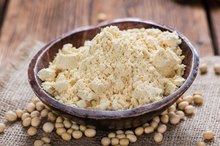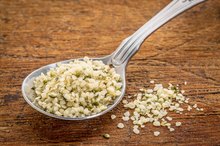Are There Any Side Effects of Protein Powder?
Although most protein powders are safe for almost everyone, they are dietary supplements that have not been approved or regulated by the U.S. Food and Drug Administration. Scientific research has tied several positive side effects to protein powder, especially to whey, but studies are ongoing to evaluate the potential negative effects of various protein powder sources as well.
Digestive Discomfort
Some of the most popular protein powders on the market are made from whey and casein, both types of milk protein. Although milk protein powder concentrates and isolates naturally have less lactose than milk and most milk products, they can still cause digestive discomfort for people who have lactose intolerance. Whey and soy protein powders may also cause stomach pain, constipation or diarrhea if you take them in large amounts.
Cancer Risk
Does a Protein Powder Have Carbohydrates?
Learn More
Soy protein powder is a concentrated source of phytoestrogens, plant-based compounds that can mimic estrogen hormones in the human body. Moderate soy consumption is safe for most people, but high levels of phytoestrogens may increase the risk of certain cancers for both men and women. Specifically, a few studies have indicated that a high intake of phytoestrogens may increase breast cancer risk or breast cancer reoccurrence rates, although research on the subject is inconclusive.
Heavy Metal Toxicity
In a study published in 2010 by "Consumer Reports," researchers discovered that every sample of 15 different tested protein powders contained trace amounts of toxic heavy metals. Each sample tested positive for one or more of the heavy metals lead, cadmium, arsenic and mercury, and three samples were found to contain potentially toxic doses of the metals in three servings. Continued low-level consumption of such heavy metals can produce symptoms including fatigue, constipation, headaches and pain in muscles and joints.
Positive Effects
Immunocal Dangers
Learn More
Protein powders may produce several positive physical effects. In a scientific trial published in 2011 in the “Journal of Nutrition,” overweight subjects who took whey protein supplements experienced significant improvements in body composition, despite changing nothing else about their diets or lifestyles. Soy protein supplements did not have the same effect, which implies that the primary source of your protein powder may determine how much body fat you lose, if any. Additionally, if you work out with weights or do another type of resistance exercise, taking protein powder may have the effect of enhancing your performance. In a study published in 2013 in “Nutrition Journal,” both whey and rice protein powder supplementation led to gains in strength, power and muscle mass among healthy subjects who trained regularly.
- Protein powders may produce several positive physical effects.
- In a study published in 2013 in “Nutrition Journal,” both whey and rice protein powder supplementation led to gains in strength, power and muscle mass among healthy subjects who trained regularly.
Related Articles
References
- Journal of Nutrition: Whey Protein but Not Soy Protein Supplementation Alters Body Weight and Composition in Free-Living Overweight and Obese Adults
- DrAxe.com: Which Protein Is Better, Whey or Soy?
- Nutrition Journal: The Effects of 8 Weeks of Whey or Rice Protein Supplementation on Body Composition and Exercise Performance
- Harvard School of Public Health: Straight Talk About Soy
- MedlinePlus: Soy
- Consumer Reports: What's in Your Protein Drink
- Men's Fitness: Whey Protein
- Gilbert, J.-A., Bendsen, N. T., Tremblay, A., & Astrup, A. (2011). Effect of proteins from different sources on body composition. Nutrition, Metabolism and Cardiovascular Diseases, 21, B16–B31. DOI: 10.1016/j.numecd.2010.12.008.
- Hulmi, J. J., Lockwood, C. M., & Stout, J. R. (2010). Effect of protein/essential amino acids and resistance training on skeletal muscle hypertrophy: A case for whey protein. Nutrition & Metabolism, 7(1), 51. DOI: 10.1186/1743-7075-7-51.
- Ridge, A., Devine, A., Lyons-wall, P., Conlon, J., & Lo, J. (2018). The impact of whey protein supplementation in older adults on nutrient intakes and satiety over an 11-week exercise intervention. Food Quality and Preference, 68, 72–79. DOI: 10.1016/j.foodqual.2018.01.013.
- Tahavorgar, A., Vafa, M., Shidfar, F., Gohari, M., & Heydari, I. (2014). Whey protein preloads are more beneficial than soy protein preloads in regulating appetite, calorie intake, anthropometry, and body composition of overweight and obese men. Nutrition Research, 34(10), 856–861. DOI: 10.1016/j.nutres.2014.08.015.
- Thomas, D. T., Erdman, K. A., & Burke, L. M. (2016). Position of the Academy of Nutrition and Dietetics, Dietitians of Canada, and the American College of Sports Medicine: Nutrition and Athletic Performance. Journal of the Academy of Nutrition and Dietetics, 116(3), 501–528. DOI: 10.1016/j.jand.2015.12.006.
- Zhu, K., Kerr, D. A., Meng, X., Devine, A., Solah, V., Binns, C. W., & Prince, R. L. (2015). Two-Year Whey Protein Supplementation Did Not Enhance Muscle Mass and Physical Function in Well-Nourished Healthy Older Postmenopausal Women. The Journal of Nutrition, 145(11), 2520–2526. DOI: 10.3945/jn.115.218297.
Writer Bio
Carly Schuna is a Wisconsin-based professional writer, editor and copy editor/proofreader. She has worked with hundreds of pieces of fiction, nonfiction, children's literature, feature stories and corporate content. Her expertise on food, cooking, nutrition and fitness information comes from a Level 1 personal training certification and years of in-depth study.








